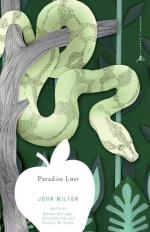|
This section contains 1,230 words (approx. 5 pages at 300 words per page) |

|
Discerning Truth from Falsehood
Summary: Examines the process by which a character determines what is reality and what is an illusion in the two works "Paradise Lost" and "Tartuffe."
Paradise Lost and Tartuffe are similar works, both exploring the subjects of truth and falsehood. As such, Milton's Paradise Lost portrays the continuous battle between good and evil. In Paradise Lost, Eve falls from the safety of the prelapsarian state into the insecure, sinful postlapsarian world because she is unable to distinguish truth from falsehood. Likewise, Molière's Tartuffe exemplifies the problem of hypocrisy. Tartuffe explores the concept of how easy it is to deceive another person, while displaying how hard it can be to distinguish the truth. Thus, these works are similar in that they strive to reveal the difficulties in determining truth from falsehood and the problems that result from being unsuccessful in this distinction.
Milton's Paradise Lost displays the difficulty in determining good from evil, or truth from falsehood. In Paradise Lost, Eve is faced with a decision: she is tempted by Satan to eat...
|
This section contains 1,230 words (approx. 5 pages at 300 words per page) |

|


